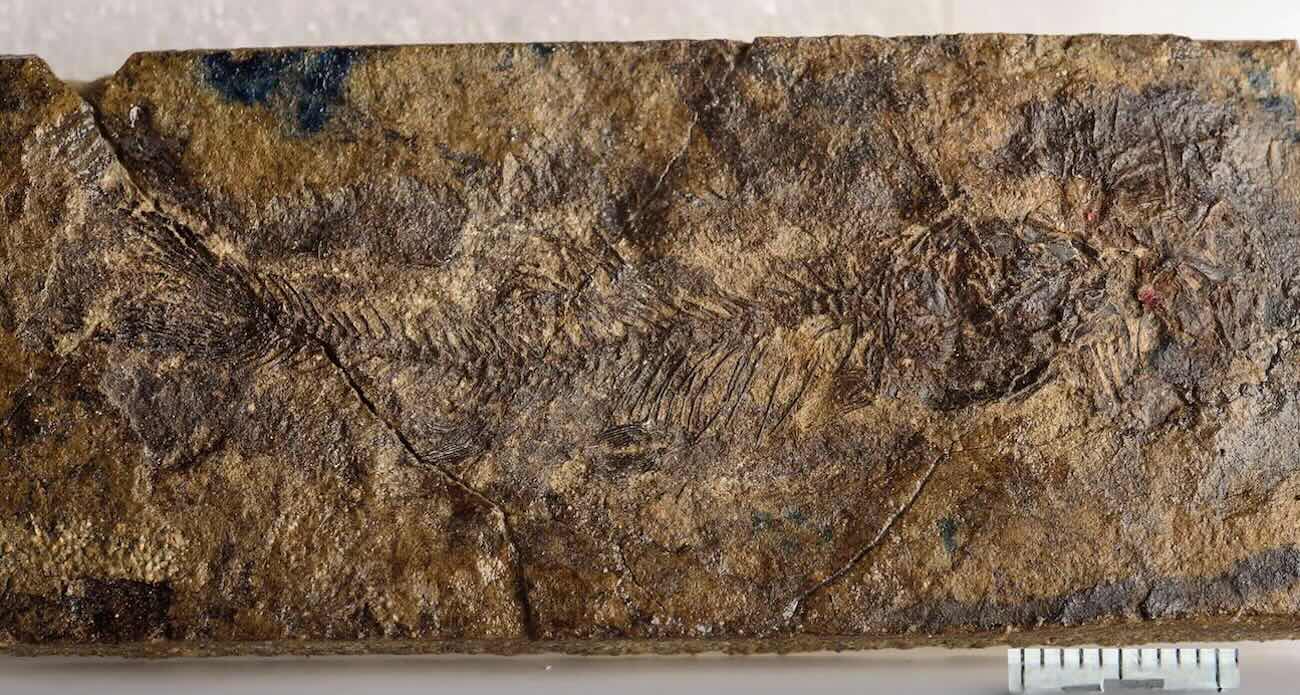Tiny Prehistoric Fish Fossil Rewrites Evolution With Clues For Mysterious Origins Of Catfish And Carp

The fossil of a tiny fish found in southwestern Alberta, Canada, provides new insight into the origin and evolution of otophysans, the supergroup of fish that includes catfish, carp and tetras—which account for two-thirds of all freshwater species today.
The specimen, located well inland from any seashore, was studied by researchers at Western University and the Royal Tyrrell Museum of Paleontology and was found to be a new kind of fish entirely.
The skeleton measures around 1.6 inches long (4 cm) and lived during the Late Cretaceous period, along with the iconic T. Rex—about 100 million to 66 million years ago.
Named Acronichthys maccognoi, the discovery was detailed in a study published this week in the journal, Science.
“The reason Acronichthys is so exciting is that it fills a gap in our record of the otophysans supergroup,” explained study author Professor Neil Banerjee. “It is the oldest North America member of the group and provides incredible data to help document the origin and early evolution of so many freshwater fish living today.”
ANOTHER MYSTERY FOSSIL: New Triassic Reptile Has Enormous Crest Unknown to Science That Upends Feather Evolution Theories
Otophysans are distinctive in the way their first four vertebrae are modified to transmit vibrations to the ear from the swim bladder (a gas-filled internal organ that allows fish to maintain their position in the water without expending significant energy)—basically functioning as a human ear.
One fish, two fish, red fish, blue fish
While the discovery of Acronichthys introduces a new species to paleontological records, it also provides critical data to trace the origins of otophysans, as the supergroup is understood to have started as a marine (saltwater) species before transitioning to a freshwater species. The discovery suggests the transition from marine to freshwater species happened at least twice during otophysans’ evolution.
The study estimated a new divergence time for otophysans from marine to freshwater species at around 154 million years ago (the Late Jurassic period) – after Pangea, the supercontinent, began to break apart 200 million years ago.
The researchers are now left trying to understand how the tiny Acronichthys moved from continent to continent if they couldn’t swim across saltwater oceans—because their freshwater ancestors now live on every continent except Antarctica.
GOOD NEWS FOR FISH:
• After 50 Years, Trout Population Is Restored to Historic Numbers in One of Largest Lakes in US
• Fish Rescued From Garden Pond After it Grew to be 6-feet Long–From Just Six Inches
“There’s still so much we don’t know, and a fossil site right here in Canada is giving us the key to understanding the origins of groups that now dominate rivers and lakes around the world,” said Don Brinkman, curator emeritus at the Royal Tyrell Museum in a media release.
Earth sciences Professor Lisa Van Loon at Western University, used synchrotron beam-lines to capture a more sophisticated, detailed look of the skeleton, with computed tomography (micro-CT) scans—high-resolution X-ray images that create 3D virtual models of objects while they rotate.
“Many of the fossil specimens collected by the Royal Tyrrell Museum are incredibly fragile, and some are impossible to extract from the rock itself, so micro-CT scans provide not only the best method for acquiring detailed images of what’s inside, they’re also the safest way to avoid destroying the fossil all together,” said Van Loon.
COOL FOSSIL NEWS:
• Two Halves of the Same Fossil Stored at Different Museums Reunited to Form New Species
• New Yorker’s Yardwork Reveals Complete Mastodon Jaw Bones and Teeth (LOOK)
“Dinosaurs are pretty exciting, so a lot of time and effort has been focused on them… but we’ve only scratched the surface when it comes to understanding the diversity of prehistoric freshwater fish,” concludes Brinkman.
SET THE HOOK OF CURIOSITY In Your Fish Loving Friends–Share on Social Media!



Please be good and do not spam. Thank you.